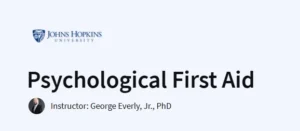Primeros Auxilios Psicológicos (PAP)
A highly informative course offering essential skills in Psychological First Aid, suitable for professionals and volunteers involved in crisis intervention.
What you will learn in Primeros Auxilios Psicológicos (PAP) Course
- Recognize the characteristics of disasters and their impact on mental health.
- Understand stress responses individuals may exhibit in dangerous situations.
- Identify common mental health disorders related to disasters.
Apply the principles and objectives of Psychological First Aid.
Recognize personal traits that enhance effectiveness in assisting affected individuals.
Program Overview
Introduction to Disasters and Psychological First Aid
⏱️3 hours
- Explore the concept of disasters, both natural and human-made.
- Understand their potential consequences on physical and mental health.
- Learn the fundamentals of Psychological First Aid and its importance in crisis situations.
Stress Responses and Mental Health Disorders
⏱️4 hours
- Examine acute stress reactions and post-traumatic stress disorder (PTSD).
- Identify symptoms and risk factors associated with these conditions.
- Discuss the importance of early intervention in mitigating long-term effects.
Principles and Objectives of Psychological First Aid
⏱️ 3 hours
- Delve into the core principles guiding PAP interventions.
- Learn the objectives aimed at providing immediate relief and support.
- Understand the ethical considerations and cultural sensitivity required in PAP.
Application of Psychological First Aid
⏱️3 hours
- Study various scenarios where PAP can be applied.
- Learn techniques for effective communication and support.
- Discuss the role of professionals and volunteers in delivering PAP.
Special Considerations in Psychological First Aid
⏱️ 3 hours
- Address the needs of specific populations, including children, the elderly, and individuals with disabilities.
- Learn tailored approaches to provide appropriate support to these groups.
Self-Care for Responders
⏱️ 3 hours
Understand the importance of self-care for individuals providing PAP.
Learn strategies to manage stress and prevent burnout.
Discuss the role of supervision and peer support in maintaining well-being.
Get certificate
Job Outlook
- The demand for professionals trained in Psychological First Aid is increasing, particularly in fields such as healthcare, education, social services, and emergency response.
- Key skills include crisis intervention, active listening, empathy, and cultural competence.
- Professionals with PAP training are well-equipped to support individuals affected by trauma and contribute to community resilience.
9.9Expert Score
Highly Recommended
This course provides essential training in Psychological First Aid, offering practical skills applicable in various crisis situations.Value
9.5
Price
9.3
Skills
9.8
Information
9.7
PROS
- Comprehensive coverage of Psychological First Aid principles and practices.
- Practical skills applicable in real-world crisis situations.
- Free access with optional paid certificate.
- Suitable for professionals and volunteers in various fields.
- Emphasis on self-care for responders to prevent burnout.
CONS
- Course content is in Spanish; may require translation for non-Spanish speakers.
- Limited interactive elements; primarily video-based learning.
- No formal certification upon completion without payment.
Specification: Primeros Auxilios Psicológicos (PAP)
|
FAQs
- Estimated duration is 2 weeks, assuming ~10 hours of study per week—totaling roughly 20 hours.
- It’s fully self-paced, giving you flexibility to advance on your schedule.
- No prior experience is required; the course welcomes learners from any background.
- Covers fundamental principles in an accessible format.
- The course covers essential competencies in:
- Understanding disasters, stress responses, and trauma.
- Applying Psychological First Aid (PAP) techniques.
- Practicing crisis intervention, mental health awareness, and stress management.
- Offering support across diverse populations, including children and vulnerable groups.
- Prioritizing self-care and resilience for responders.
Strengths:
- Rated 4.9/5 from over 11,000 learners—highly praised for clarity, structure, and applicability.
- Course format includes videos, role-play examples, readings, and quizzes, making it both engaging and practical.
Considerations:
- Content is primarily video and reading-based, with minimal interactive or live components.
- Delivered in Spanish only, so not ideal for non-Spanish speakers.
Beneficial for:
- Health professionals, educators, social workers, volunteers in crisis or disaster response.
- Individuals wanting to build psychological support skills for friends, family, or community settings.
- Offers a certification from a respected university to showcase your training.
- Teaches widely recognized PAP strategies recommended by organizations like WHO or mental health networks.





